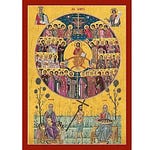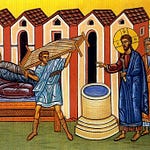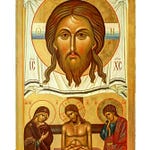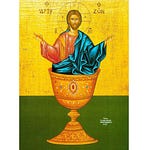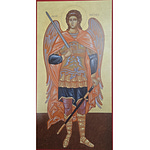In Isaiah 29, thus says the Lord: “This people honors me with their lips, but their heart is far from me.” This again teaches us something fundamental about Christianity: All God wants is the human heart. He wants the hearts of individuals, and He wants the heart of a whole people, a whole community. God also wants, in other words, the heart of a parish. And it is in this sense of the heart of a parish that I will use to reflect upon the Parable of the Sower.
God sends His Holy Spirit to transform heart of a parish, to make it into good soil. It takes time for the heart to be transformed from life in the flesh to life in the Spirit; it takes time to transform even regular soil, so how much more so the human heart? Back in our former parish, we befriended a farmer, and he told me it takes at least seven years to make regular, industrial-farmed soil into the kind of soil that produces organic vegetables. Putting that time in is what it means to be a farmer, he told me. It is work, but the best kind: for it yields fruit.
The Parable of the Sower is all about this. It is all about the transformation of barren ground into soil; that is, into a true heart. The Parable of the Sower presents Jesus Christ, Holy Spirit, and us as a parish cryptically. Neither Persons of God are named in the parable, and neither are we, but to make the connections is not that difficult. The sower that went out to sow is Jesus Christ; and what the sower sowed is the Holy Spirit. This matches with what Saint John recorded our Lord teaching in John 15:26: “When the Counselor comes, whom I shall send to you from the Father, even the Spirit of truth, who proceeds from the Father, He will bear witness to me.” The Holy Spirit proceeds from the Father, through Christ Who sends the Holy Spirit upon human souls. The Holy Spirit bears witness to Christ – His power is the means by which we are able to hear the Word of God who is Christ.
As to us, we as a parish are named numerously in the Parable. We are named in the sense of what our parish might be, given our faith, and given how much this parish embraces Baptism, which gives us the presence of the Holy Spirit, and the potential for His power.
A parish might be the path. What is the path? Those parishes that are the path have at most a vague understanding of Jesus Christ at all, and ideas they have may be false ideas. The actual Jesus Christ is He who is known only through the opening of Scripture and Breaking of Bread. And so a “path parish” knowing hardly anything of the true Christ, the birds (that is the Devil and his minions) snatches away the seed – that is, snatch away the Holy Spirit, Who fills and blesses all things – so that a parish will not come upon these holy seeds and become enlightened.
If a parish is not the path, then a parish might be rocky ground. What is a rocky ground parish? It is a parish which is at the beginning of true discipleship of Christ. The sword of the Spirit has begun to pierce what was mere path and break open the path into rocks, so as to receive the Holy Spirit. Such parishes do receive feelings of joy and consolation upon hearing the Word proclaimed and perhaps in the Eucharist. They have Mass and are quite happy for the fellowship. But because, as our Lord taught, that parish has no root (meaning, no discipline of prayer, no habit of prayer, and no habit of fostering a quiet mind, which I will return to below) and when society, the world of the flesh, presses its values upon the rocky path parish, the parish chooses worldly values instead of godly ones. This may be a real parish but there is as of yet no deep Christian identity. Much work remains to do.
If not rocky ground, a parish might be thorns. What is a thorn parish? A thorn parish is one that does have deeper experience in church life and perhaps has been around a long time. The Sword of the Spirit has broken open this parish’s heart (perhaps a decade or two ago perhaps through the work of a rector long ago), and in the parish are disciplines of devout attendance of church as well as Christian service and giving, and intercessory prayer for others. But what has not developed in the parish are thoroughly Christian disciplines which I alluded to above: disciplines of regular prayer with the psalms, daily reading of Scripture, of examination of conscience, of devotion to the Saints, the daily Offices: and all with a quiet mind whereby the whole parish can sit in silent adoration of God: silent awe and wonder of God, that takes one’s breath away. Thorn parishes have a life ordered by the Eternal Word of God; but also tend to give disproportionate emphasis in the parish to finances and being in tune with society. Money and society are inevitable aspects of Christian life; but disproportionate focus on them will crowd out deeper engagement and participation in the grace Christ freely offers to those parishes that yearn for Him above all else; those parishes that are unapologetically God-centered.
And this takes us to good soil parishes. Those parishes that are good soil make the Cross the center of their existence, are seeking to be better disciples (that is, students) of Christ, and have taken up Christian disciplines mentioned above out of their love of God and desire for ever-deeper relationship with Jesus Christ through the Holy Spirit. Regularly praying with Psalms; sacred reading of Scripture, regularly examination of conscience to detect sinful patterns of life, a deep devotion to the Saints and their witness to Jesus Christ in their lives, the desire to sit quietly and focus on Christ, praying the full liturgy of the Church which means Matins and Evensong: Good soil is a parish alike in every way possible to the Upper Room Church of Jerusalem.
Dear brothers and sisters, let us ask God for His help to do the work He wants us to do: work that bears fruit. Let us ask God to assist us to become good soil. Let us ask God to turn the presence of the Holy Spirit in our parish into His power in and through us. Let us ask God to help us be the good soil that hears the Word and understands it. Let us ask God to help be the good soil which bears spiritual fruit – thirtyfold, sixtyfold, a hundredfold. The Holy Spirit dwells in each one of us, through Baptism. Let us continually ask God to bestow upon our parish church of Saint Paul the manifold gifts of the Holy Spirit, that our hearts being illumined by Christ’s truth, and our minds purified by Christ’s presence, this parish may day by day be strengthened with the power of the Holy Spirit inwardly in our souls, through Jesus Christ our Lord. Amen.



